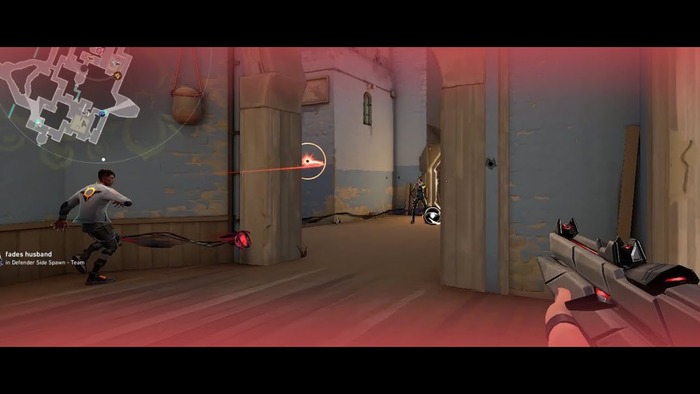What Is KAST in Valorant Gameplay?
wp:paragraph
KAST in Valorant is a performance metric that tracks the percentage of rounds where a player earns a Kill, Assist, survives, or gets traded, giving a more complete picture of their overall impact beyond just eliminations.
/wp:paragraph
wp:paragraph
Hey, Valorant players and stat fans! Today, we’re diving into a stat beyond simple kills and deaths: KAST.
/wp:paragraph
wp:paragraph
If you’ve ever felt like your scoreboard doesn’t reflect your full contributions, KAST is the stat you need.
/wp:paragraph
wp:paragraph
Let’s look at how this metric can help you improve your performance and elevate your game!
/wp:paragraph
wp:image {“id”:25638,”width”:”686px”,”height”:”auto”,”sizeSlug”:”full”,”linkDestination”:”none”,”align”:”center”}

/wp:image
wp:heading
How KAST Affects Gameplay in Valorant
/wp:heading
wp:paragraph
KAST, short for “Eliminate, Assist, Stay Alive, Avenged,” is a metric to assess a player’s influence throughout a match, beyond basic kills and deaths.
/wp:paragraph
wp:paragraph
It calculates the percentage of rounds in which a player plays a role in at least one of these actions:
/wp:paragraph
wp:list
- wp:list-item
- Eliminate: Achieving an opponent’s removal
/wp:list-item
/wp:list
wp:paragraph
/wp:paragraph
wp:list
- wp:list-item
- Assist: Supporting a teammate in securing an opponent’s removal
/wp:list-item
/wp:list
wp:paragraph
/wp:paragraph
wp:list
- wp:list-item
- Stay Alive: Remaining in the game until the round ends
/wp:list-item
/wp:list
wp:paragraph
/wp:paragraph
wp:list
- wp:list-item
- Avenged: A teammate eliminates the opponent shortly after the player’s removal
/wp:list-item
/wp:list
wp:paragraph
KAST is a percentage, with higher values indicating a more consistent contribution throughout the rounds.
/wp:paragraph
wp:paragraph
It highlights players who, while not always on top of the leaderboard, actively help the team succeed.
/wp:paragraph
wp:heading
How the Game Calculates the Contribution Score?
/wp:heading
wp:paragraph
Although the developer hasn’t shared the exact formula, the general principle behind the contribution score calculation is well understood.
/wp:paragraph
wp:paragraph
Calculation Formula:
/wp:paragraph
wp:paragraph
Contribution Score % = (Rounds with a Positive Action / Total Rounds Played) x 100
/wp:paragraph
wp:paragraph
For example, if you contributed positively in 16 out of 20 rounds, your contribution score would be (16/20) x 100 = 80%.
/wp:paragraph
wp:paragraph
Key Notes About Contribution Score Calculation:
/wp:paragraph
wp:list
- wp:list-item
- You count a round if you contribute significantly, such as a kill, assist, survival, or trade.
/wp:list-item
/wp:list
wp:paragraph
/wp:paragraph
wp:list
- wp:list-item
- Multiple actions in a single round (e.g., scoring a kill and staying alive) won’t increase the score for that round.
/wp:list-item
/wp:list
wp:paragraph
/wp:paragraph
wp:list
- wp:list-item
- The “Trade” action usually has a short time limit (often around 5 seconds) after your elimination.
/wp:list-item
/wp:list
wp:image {“id”:25636,”width”:”674px”,”height”:”auto”,”sizeSlug”:”full”,”linkDestination”:”none”,”align”:”center”}

/wp:image
wp:heading
How to Improve Your Contribution Score
/wp:heading
wp:paragraph
Want to increase your contribution score? Here are some tips:
/wp:paragraph
wp:list
- wp:list-item
- Focus on Team Support: The contribution score rewards consistent teamwork. Contribute to your team’s efforts, not just by getting eliminations but by supporting others.
/wp:list-item
/wp:list
wp:paragraph
/wp:paragraph
wp:list
- wp:list-item
- Stay Alive: Prioritize surviving the round. Staying alive, especially in crucial situations, is essential.
/wp:list-item
/wp:list
wp:paragraph
/wp:paragraph
wp:list
- wp:list-item
- Utilize Your Tools Effectively: Assists matter! Use your character’s abilities to help others secure victories.
/wp:list-item
/wp:list
wp:paragraph
/wp:paragraph
wp:list
- wp:list-item
- Provide Information on Eliminations: If an enemy eliminates you, quickly communicate their positions to help your team respond.
/wp:list-item
/wp:list
wp:paragraph
/wp:paragraph
wp:list
- wp:list-item
- Play to Your Strengths: Different characters play different roles. Support specialists focus more on surviving, while aggressive roles aim for elimination and trade.
/wp:list-item
/wp:list
wp:paragraph
/wp:paragraph
wp:list
- wp:list-item
- Avoid Risky Moves: Being too reckless can lead to early eliminations, hurting your contribution score. Play wisely to minimize risks.
/wp:list-item
/wp:list
wp:paragraph
/wp:paragraph
wp:list
- wp:list-item
- Aim for Consistency: The contribution score values steady performance over rare high-impact moments.
/wp:list-item
/wp:list
wp:paragraph
/wp:paragraph
wp:list
- wp:list-item
- Improve Your Accuracy: Better targeting leads to more eliminations and assists, boosting your score.
/wp:list-item
/wp:list
wp:paragraph
/wp:paragraph
wp:list
- wp:list-item
- Know Common Engagement Spots: Learn where your team will likely support you after engaging an opponent.
/wp:list-item
/wp:list
wp:paragraph
/wp:paragraph
wp:list
- wp:list-item
- Review Your Actions: Analyze rounds where you didn’t make a significant impact and think about how you could improve next time.
/wp:list-item
/wp:list
wp:heading
Other Related Concepts
/wp:heading
wp:image {“id”:25637,”width”:”678px”,”height”:”auto”,”sizeSlug”:”full”,”linkDestination”:”none”,”align”:”center”}

/wp:image
wp:paragraph
When talking about KAST in a tactical shooter, you may come across the following terms:
/wp:paragraph
wp:list
- wp:list-item
- Combat Performance Score: This metric measures your overall efficiency, focusing on the damage you deal and the eliminations you make.
/wp:list-item
/wp:list
wp:paragraph
/wp:paragraph
wp:list
- wp:list-item
- Round Damage Average: This tracks the typical damage you inflict during each cycle.
/wp:list-item
/wp:list
wp:paragraph
/wp:paragraph
wp:list
- wp:list-item
- Performance Ratio: A standard measurement based on eliminations, deaths, and support actions.
/wp:list-item
/wp:list
wp:paragraph
/wp:paragraph
wp:list
- wp:list-item
- Lead Attacker: A player who seeks to secure the first elimination in a round, often impacting your performance rating.
/wp:list-item
/wp:list
wp:paragraph
/wp:paragraph
wp:list
- wp:list-item
- Flanker: A player who moves away from the leading group, affecting their impact score differently.
/wp:list-item
/wp:list
wp:paragraph
/wp:paragraph
wp:list
- wp:list-item
- Game-Winner: A player who clinches the round as the final survivor, improving the overall performance score.
/wp:list-item
/wp:list
wp:paragraph
/wp:paragraph
wp:list
- wp:list-item
- Resource Management Rating: This assesses how well you handle your in-game resources, which can affect your overall performance indirectly.
/wp:list-item
/wp:list
wp:paragraph
/wp:paragraph
wp:list
- wp:list-item
- Critical Eliminations: Kills that have a significant influence on the round’s outcome, boosting your score.
/wp:list-item
/wp:list
wp:paragraph
/wp:paragraph
wp:list
- wp:list-item
- Skill Damage: The damage dealt using special abilities can add to team support actions and influence your score.
/wp:list-item
/wp:list
wp:paragraph
/wp:paragraph
wp:list
- wp:list-item
- Initial Kill: The first elimination of a round, often crucial for the lead attacker’s performance rating.
/wp:list-item
/wp:list
wp:paragraph
/wp:paragraph
wp:list
- wp:list-item
- Post-Objective Phase: After completing a key mission task, survival becomes critical for your performance.
/wp:list-item
/wp:list
wp:paragraph
/wp:paragraph
wp:list
- wp:list-item
- Kill Exchange Efficiency: Your team’s elimination exchange success rate directly impacts your performance rating.
/wp:list-item
/wp:list
wp:paragraph
To sum up, while significant eliminations and high frag counts may be exciting, the performance score highlights the importance of teamwork.
/wp:paragraph
wp:paragraph
Your impact comes in many forms—whether you’re securing kills, helping teammates, winning critical rounds, or executing perfect exchanges—every action you take influences your overall performance and your team’s success.
/wp:paragraph
wp:paragraph
So, next time you’re in action, think beyond eliminating enemies and consider how you can contribute in various ways.
/wp:paragraph
wp:paragraph
Improve your performance and help your team achieve success!
/wp:paragraph





